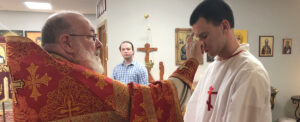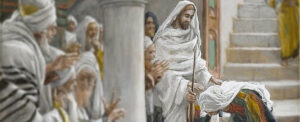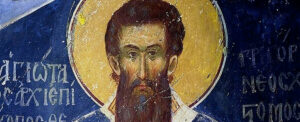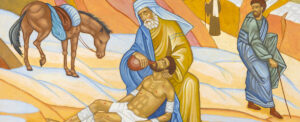Ephesians 2:14-22. Luke 13:10-17.
Glory to God the Father, the Son, and the Holy Spirit. Amen.
Today the Lord teaches us about the sabbath, the seventh day of the week. On this day, under the law of Moses, the Hebrews were commanded to stop their daily work, and be about the business of the Lord.
Do we Christians keep the sabbath? Of course! The word means “seventh day,” and in most of our languages we still call it Σάββατο, суббота, sábado, and so on.
With the incarnation of Christ our God, Christians began to look at the command in the law of Moses to keep the seventh day holy, in light of the Resurrection. The seventh day is followed, not only by the first day of a new week, but by something new: The seven days of creation, ending with the sabbath rest of the Lord, are followed by a new creation, an Eighth Day. An eternal day of the Lord, a life in the Kingdom of God. That eternal day will begin when Christ returns to judge the living and the dead, and his kingdom shall have no end — but as we heard in this morning’s epistle reading, we are citizens here and now together with the saints. Subject to the law of the Kingdom, living the life of the resurrection even here and now in mortal bodies.
So, do we Christians keep the sabbath? Absolutely – it has not gone away. To this day, on the sabbath day we Christians rest from our labor of fasting: Why do you think we had fish, wine, and oil yesterday in the middle of the fast? On Saturdays we don’t prostrate in the church, but we stand in the Liturgy, the same as on Sunday.
And on Saturdays we commemorate all our departed ones; yesterday if you were here before Vespers we sang a memorial service for the blessing of all those who are now resting in the body and awaiting the resurrection.
Saturday is when we make present the reality that Christ has fulfilled the sabbath of the law of Moses, when the Lord rested in his own body in the grave on the sabbath – even as in spirit he was announcing the good news to the dead, bursting open the bars of hades, and leading all the righteous out into Paradise. On the sabbath day Christ was about his Father’s business.
Saint Paul writes to Christian people:
There remains therefore a sabbath-rest to the people of God. For he that is entered into his rest, he also has ceased from his own works, as God did from his. Let us labor therefore to enter into that rest (Hebrews 4:9-11).
We have already lived lives in pursuit of our own desires and ego and will. And what did that get us? So we are called to lay aside the works of the flesh and our own will, rest from serving ourselves, and enter into the life of Christ, being about the business of his Father.
* * *
Today, seeing this woman, bent over with a spirit of infirmity, the Lord had compassion. “Woman, you are loosed from your infirmity.” And he laid his hands on her, and immediately she was made straight, and glorified God.
But the president of the synagogue was angry. “There are six days for work. So come and be healed on those days, not on the Sabbath.”
Now, was anybody working at this point? Did Jesus do any labor? Did the woman? Not at all.
In fact, today’s reading is very similar to a story we’ve read before in Matthew chapter 9, where some men brought a paralyzed man to the Lord.
When Jesus saw their faith, he said to the man, “Son, be of good cheer; your sins are forgiven.” At this, some of the teachers of the law said to themselves, “This fellow is blaspheming!” Knowing their thoughts, Jesus said, “Why do you entertain evil thoughts in your hearts? Which is easier: to say, ‘Your sins are forgiven,’ or to say, ‘Get up and walk’? But I want you to know that the Son of Man has authority on earth to forgive sins.” So he said to the paralyzed man, “Get up, take your mat and go home.” Then the man got up and went home. When the crowd saw this, they were filled with awe; and they praised God, who had given such authority to man (Matthew 9:2-8).
Which thing is easier to do? Well, obviously it’s easier to say “Your sins are forgiven.” Anybody could say those words. But to say to a paralyzed man, “Get up and walk,” and work a miracle – that takes authority from God. Jesus is effortlessly demonstrating that he has both the power to heal the sick and to forgive sins – because he is God.
And so this morning, without compounding any medicines, applying any therapy, doing anything – the Lord simply lays his hand on the woman ans says, “You are set free.” It’s no effort at all for him. And she receives her healing.
But the synagogue president is angry.
The Lord sees what is happening. The synagogue leader can’t really accuse anyone of breaking the law of Moses here; he is just envious.
The Lord answered him, “You hypocrite! Doesn’t each of you on the Sabbath untie your ox or donkey from the stall and lead it out to give it water?
Here is his point: there is no law against doing good, doing God’s good will, serving the Lord, on the Sabbath day.
When Saint Paul describes the fruit of the Spirit, love, joy, peace, longsuffering, kindness, goodness, faithfulness, gentleness, self-control (Galatians 5:22-23), he adds: “Against such things there is no law.”
Question: Does God have one perfect person out there for you to marry? Does He want you to have one specific job? If you don’t figure it out, and you get it wrong, are you in trouble?
If you are wondering what Gods will is for you in this life, here is God’s will for you: Do love, joy, peace, longsuffering, kindness, goodness, faithfulness, gentleness, self-control. The prophet Micah says, “He has shown you, O man, what is good. And what does the Lord require of you, but to do justice, and to love mercy, and to walk humbly with your God?” (Micah 6:8). “These three things abide: faith, hope, and love” (1 Corinthians 13:13). Against such things there is no law.
If you have an idea to do good, and it’s within your power, or you can bring some others together to accomplish it: Do it! If it’s here within the walls of the Church, then ask the priest’s blessing and do it!
“The way of a fool is right in his own eyes, but a wise man listens to advice” (Proverbs 12:15). Get someone else’s eyes on your idea. Write your idea. When the Lord gave a vision to Habakkuk, he told him: “Write the vision, make it plain on tablets, That he may run who reads it” (Habakkuk 2:2).
When you know to do good, then unless it’s sin, or for some reason it’s unwise at this time, “against such things there is no law.”
The worst that can happen is you fail. And fear of failure is fear of a shadow, a rumor, it’s nothing at all. A majority of businesses go out of business in just a few years. Did they fail? Or did they learn?
So on the Sabbath – and every day – we look for opportunities to do what pleases the Lord.
As fellow-citizens with the saints in the kingdom of God, here and now, we know God’s will, we have marching orders to do justice, to love mercy, and to walk humbly: To do faithfulness, hope, and love. What does that look like?
On this morning, at this synagogue, it looked like freeing a woman from a spirit of infirmity.
“Doesn’t each of you on the Sabbath untie your ox or donkey and lead it out to give it water? Then should not this woman, a daughter of Abraham, whom Satan has kept bound for eighteen long years, be set free on the Sabbath day from what bound her?”
Archbishop Anthony (Khrapovitsky) notes:
These words raise questions: if she had not been touched by Satan, would there not have been any illness? And why did the Lord allow this touch, if He points to the need to free her from the bonds of Satan?
This must be answered as follows: some illnesses occur for the correction of a person after his sins. This is said in the healing of the paralytic: “Go and sin no more, lest a worse thing come to you” (John 5:14).
It is absolutely true that some of the disorders in our body are the result of our sins. A lifetime of smoking or heavy drinking will take its toll when you get older. Freely indulging our disordered appetites and pleasures can damage our ability to own our words and actions – so that we have warfare against addictive compulsions and responses, dependent and codependent behaviors, expressions of our ego and need for validation.
Less obviously, Saint Paul notes that coming to the Communion cup without preparation can be harmful to us. “For he who eats and drinks in an unworthy manner eats and drinks judgment to himself, not discerning the Lord’s body. For this reason many are weak and sick among you, and many have fallen asleep [in death]” (1 Corinthians 11:29-10).
And some of our behaviors, instead of making us communicants of the Lord’s table, make us communicants with the demons. Speaking of idolatry, violence, and sexual impurity, Paul warns that “the things which the nations sacrifice they sacrifice to demons and not to God, and I do not want you to have communion with demons. You cannot drink the cup of the Lord and the cup of demons; you cannot partake of the Lord’s table and of the table of demons” (1 Corinthians 10:20-21).
“Therefore submit yourselves to God. Resist the devil, and he will flee from you. Draw near to God, and he will draw near to you. Cleanse your hands, ye sinners; and purify your hearts, ye double minded. (James 4:7-8).
Now, is every sickness or disorder of mind or body a demon? Of course not. Even before we understood germ theory or genetics, no generation of Christians has ever disdained the wisdom and work of wise doctors – beginning with the Apostle and Evangelist Luke, whom Saint Paul calls a physician (Colossians 4:14).
And we can’t assume sickness and disorder are the result of sin. In John Chapter 9, Christ and his apostles meet a man born blind. The apostles, believing that bad things happen to you because you’ve done bad things, so they are are confused: “Who sinned?” This man was born without eyes – how could he have earned this? Or is this payback for his parents’ sins? And the Lord answers, “No! That’s not how it works. That’s not how any of this works! This happened so that the works of God might be revealed in him” (John 9:1-41).
It is not so useful to find out why these people were born strong and healthy, these were born weak and ill, and those were born with serious troubles of body and mind. What we need to understand is what struggle is laid before all of us all. “We are God’s workmanship, created in Christ Jesus to do good works, which God prepared in advance for us to do” (Ephesians 2:10). “Let us lay aside every encumbrance, and the sin which so easily entangles us, and let us run with endurance the race that is set before us, fixing our eyes on Jesus the author and perfector of our faith” (Hebrews 12:2).
So how does the Lord heal us from our sins and sicknesses of soul and body? That depends on the state of the heart or moral condition of the patient. Sometimes the Savior heals with a word or a touch, sometimes he orders something to be done: “Go wash in the pool of Siloam” (John 9:7). Some he heals without their even asking; others, he asks them to talk about their faith and he teaches them.
In every case, the Lord pursues his goal of saving them, soul and body. We’ve said before that the biblical Greek word for salvation is also the word for healing, wholeness, soundness, deliverance, preservation.
We don’t believe in being saved from our sins in an instant, or by a single act of faith one day. If my body were full of cancer and bullet wounds, it would be delusional for me to tell you that I am whole and well. But when I receive remission from my illnesses and rise up from my bed and return to health, then I can say in truth that I am healed and saved from the infirmity of my body.
In the same way, a person in whom the compulsion and damage of sins is still present can’t say honestly that he has been saved and healed from his sins.
When someone asks if you’ve been saved, here’s an honest answer:
I was saved two thousand years ago when God became incarnate in the Virgin’s womb and joined the life of my kind to the life of God in himself. In his cross and resurrection Christ broke the power of every enemy and set the human race free.
Right now I am being saved, daily, working out my salvation (Philippians 2:12) in repentance and faithfulness, by the action of God’s grace in me.
And I have confident hope that on the last day, the God who loves me and gave himself for me will raise me up into immortality and will save me from all suffering of soul and body, to sit with him at his right hand.
I want to close by inviting you to enter into this life of hope and faith, lay down your own works and do the will of God, and hear Christ say to you, “Woman you are set free. Man, you are set free.” We are in the middle of the days of preparation leading up to the feast of the birth in the flesh of our God and Savior. Saint Athanasius the Great says:
See what fasting does: it heals illnesses, drives out demons, removes wicked thoughts, and makes the heart pure. If someone has even been seized by an impure spirit, let him know that this kind, according to the word of the Lord, “goeth not out but by prayer and fasting” (Matthew 17:21).
We know fasting is not only dieting from some particular kinds of luxury foods, but also being watchful to turn away thoughts of impurity, abstaining from idle talk, from both condemnation and flattery, from remembrance of our own past sins and those of others. “For what good is it if we abstain from birds and fishes, but bite and devour our brothers and sisters?” (St John Chrysostom)
Saint Basil says, “By fasting it is possible both to be delivered from future evils and to enjoy the good things to come. We fell into infirmity through sin; let us receive healing through repentance, which is not fruitful without fasting.”
With our eyes fixed on Christ, who fulfilled all things for us and has sat down at the right hand of the Father; by the action of grace, through faithfulness, we will be saved from our sins, as we do justice, love mercy, and walk humbly with our God. That’s a fast that pleases God.
To the glory of God the Father, the Son, and the Holy Spirit.






